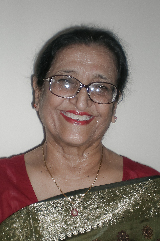
New Delhi: The 2021 edition of the Jawad Memorial Prize for Urdu-English Translation has been awarded jointly to Aalim Akhtar’s translation of Zakia Mashhadi’s Hari Bol and Bilal Tanweer’s translation of Keera (Parasite) by Bilal Hasan Manto.

Zakia Mashhadi. Photo: wordswithoutborders.org.
Of the former, the jury noted, “The story depicts life lived at a most basic level. It examines the complexity of human relationships with an unsentimental, even pitiless gaze. The language used is direct and the translation is very close to the original text, lucid and accessible.”
At the same time, the jury commended Keera for its “unusual and enjoyable” story, bordering on the surreal. “ It draws its strength from the portrayal of characters, which include a tapeworm. Both major characters, Mahmud and Maqbool, have been drawn by the author with great skill, panache, and a clinical eye for detail. The translation is free-flowing, an elegant rendering from the original, “ the jury said.

Bilal Hasan Manto. Photo: rekhta.org.
As was the case with last year’s prize, no runner-up was selected. However, the jury extended its commendations to Nazia Akhtar’s translation of Chhottam Jaan, written originally by Zeenath Sajida and Fathima M’s translation of Saaye (Shadows) by Khalid Jawed.
Also read: Haider Shahbaz’s Translation of Khalida Hussain’s ‘The Sea’ Wins 2020 Jawad Memorial Prize
The Jawad Memorial Prize gets its name from Ali Jawad Zaidi, an Urdu poet and scholar and winner of several awards including the Padma Shri, the Ghalib award, Mir Anis award among others. The Prize was initiated shortly after his birth centenary in 2016 to honour his legacy of literature that served as a bridge between languages, cultures and histories.
Apart from several books of prose and poetry, Zaidi published several scholarly works such as A History of Urdu Literature, Uttar Pradesh ke Marsiyago and Taarikh-e-Mushayara, all of which contributed to his tireless efforts towards making Urdu literature accessible to all, regardless of the language they speak.

Ali Jawad Zaidi. Photo: openlibrary.org.
The judges for this year’s prize were author, critic and translator Mohammad Asaddudin as well as columnist and chair of Amnesty International, India Aakar Patel.
Asaduddin is currently the dean of the Faculty of Humanities and advisor to the vice-chancellor at Jamia Millia Islamia University. He has a special passion for literature in translation and translation studies and has received the Katha Award, Dr A.K. Ramanujan Award, Sahitya Akademi (National Academy of Letters) Award and Crossword Book Award for his translations.
His books include Complete Stories of Premchand, Premchand in World Languages, Filming Fiction: Tagore, Premchand and Ray, A Life in Words, The Penguin Book of Classic Urdu Stories, Lifting the Veil: Selected Writings of Ismat Chughtai and For Freedom’s Sake: Manto
Patel has served as the editor-in-chief of Gujarati newspaper Divya Bhaskar and English daily Mid-Day. He is the author of Price of the Modi Years: A history of India after 2014, Our Hindu Rashtra: What it is and How We Got Here and the editor-translator of Why I Write: Essays by Saadat Hasan Manto.
Also read: Book Excerpt: The Many Anti-Muslim Laws Brought in By the Modi Government
This year’s winners
Aalim Akhtar is a PhD scholar at the Centre for English Studies, Jawaharlal Nehru University. He has taught undergraduate students at JNU and at Zakir Hussain Delhi College, Delhi University.
As part of his current translation studies course Akhtar has translated over 25 micro-fictions by Manto; a play, Anarkali by Imtiaz Ali Taj and some nazms by Jaun Elia. He has also reviewed Srikant Verma’s Relapse: The Consequences of Love, translated by Krishna Baldev Vaid, for The Book Review (Sept 2020).
Tanweer teaches at the Comparative Literary and Cultural Studies program at LUMS, Lahore and is the author of the novel The Scatter Here Is Too Great, which won the Shakti Bhatt First Book Prize and was shortlisted for the DSC Prize for South Asian Literature as well as the Chautauqua Prize (US). The novel was also translated into French and German. .
His translation of Muhammad Khalid Akhtar’s novel and stories, Love in Chakiwara and Other Misadventures, received the PEN Translation Fund Grant. More recently, with Pauline Fan, he co-edited four issues of translated works from across South and Southeast Asia for the Commonwealth magazine.
His other work includes translations of Saadat Hasan Manto and two novels of Ibn-e Safi.
Nazia Akhtar is an Assistant Professor (Human Sciences Research Group) at the International Institute of Information Technology (IIIT), Hyderabad. In 2017, she was awarded a New India Foundation fellowship to write a book on Urdu prose by Hyderabadi women. The book is expected to be in print in 2022.
Fathima M. is a doctoral candidate in English at JNU. She was a Fulbright scholar at the University of Texas, Austin in the year 2017-18.





